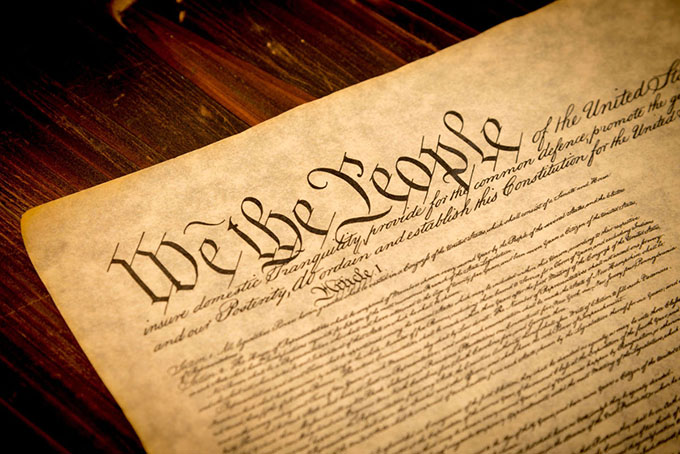
They were not “slaves” as a noun but were “enslaved” as a verb. In fact, the word “slave” actually comes from the Medieval Latin (300-900 AD) word “sclavus” because of the many Slavs, i.e., primarily Slovaks, Russians, Poles, Ukrainians, Czechs, and other Eastern Europeans who frequently had been conquered and forced into labor by other Europeans, i.e., Germans.
On Dec. 6, was exactly 150 years ago that the 13th Amendment was ratified by the states, thereby becoming a law of the land in 1865. Many people mistakenly believe this amendment ended slavery and involuntary servitude. It did not. It simply created slavery by another name.
Therefore it means that “slavery… [and] involuntary servitude… as a punishment for crime… shall exist within the United States.” Yes. That’s precisely what it means.
In other words, instead of allowing the enslavement of people simply because they were Black, it allowed the enslavement — actually, the involuntary servitude — of people victimized by newly created criminal laws. Those laws, known as Black Codes, were passed beginning in 1865 for the sole purpose of legalizing the criminalization of recently enslaved Blacks and doing so in a manner directly consistent with the tricky language of the Section 1 of the 13th Amendment.
And it must be noted the Congress that passed this amendment included the former Confederate vice president, six former Confederate Cabinet officers, 58 former members of the Confederate Congress, four former Confederate generals, and five former Confederate colonels. These redneck racist congressmen were so pleased with the trap they laid in the 13th Amendment that they, with Northern complicity, got it ratified in record time — a mere 10 months after first being introduced in Congress.
The Black Codes, which were passed in the South with the North co-signing, were part of the one-two punch. The one punch was the 13th Amendment’s maliciously racist “punishment for crime” language, and the two punch was the codes themselves, which succeeded in throwing so-called freed Blacks back into slave-like conditions via new criminal laws.
Here are some examples of those laws:
• Blacks were arrested, found guilty, fined and jailed for vagrancy, which is still defined as “having no visible means of support.” Those Blacks had just recently been held in slavery, which made it impossible to have earned income and owned property, which in turn meant they could not have accumulated any means of support whatsoever.
• After being convicted of vagrancy and other contrived charges, Blacks were legally sold into forced labor service to a master.
• So-called employed Blacks had to sign a one-year labor contract with payment not being provided until the end of that year. Often, there were so many fraudulent deductions by the employer (for rent to live on the company grounds since Blacks weren’t permitted to live anywhere else and for food and other necessities that were available only from the employers’ company store) that the employee wound up owing the employer at the end of the year.
• It was illegal for Blacks to resist corporal punishment by their employers.
• It was illegal for Blacks to quit their jobs.
• It was illegal for Blacks to speak out publicly against racism. If they did so, they’d be arrested, charged, found guilty, fined and jailed for “seditious speech.”
• It was illegal for Black men to raise their voice in the presence of a white woman.
As noted by none other than Frederick Douglass, these Black Codes led to the “convict leasing” system shortly after the ratification of the 13th Amendment. As he pointed out, “[States] claim to be too poor to maintain state convicts within [their own] prison walls. Hence the convicts are leased out to work for railway contractors, mining companies…, large plantations…, [and other private companies]. These companies assume charge of the convicts, work them as cheap labor and pay the states a handsome revenue for their labor.”
Sounds a lot like today’s “private prison” system, doesn’t it?
For more information about convict leasing, watch the enlightening documentary “Slavery By Another Name” that is available free of charge by logging onto slaverybyanothername.com.
Despite these valid critiques of the 13th Amendment, it would be foolish to argue that this amendment wasn’t a step in the right direction. But it would be wise to argue that America didn’t really give a damn about genuine and absolute freedom for Blacks. If it did, it would never have allowed the South to include that tricky “punishment for crime” language, which has led to more Black men being in prison or jail, and under other punitive criminal court sentences in 2015 than there were enslaved in 1850.
What’s the solution? Well, it’s certainly not to abolish the 13th Amendment. Instead, it’s to amend the amendment so it will say “Slavery and involuntary servitude are hereby abolished.” Period. Let’s start pushing to amend the amendment beginning on the 150th anniversary.
Michael Coard, Esquire, can be followed on Facebook, Twitter and Instagram. His “Radio Courtroom” show can be heard on WURD-900 AM.
https://www.phillytrib.com/commentary/slavery-trapdoor-remains-blot-in-th-amendment/article_c87284c8-df98-5282-b357-2b5b07ec8c37.html